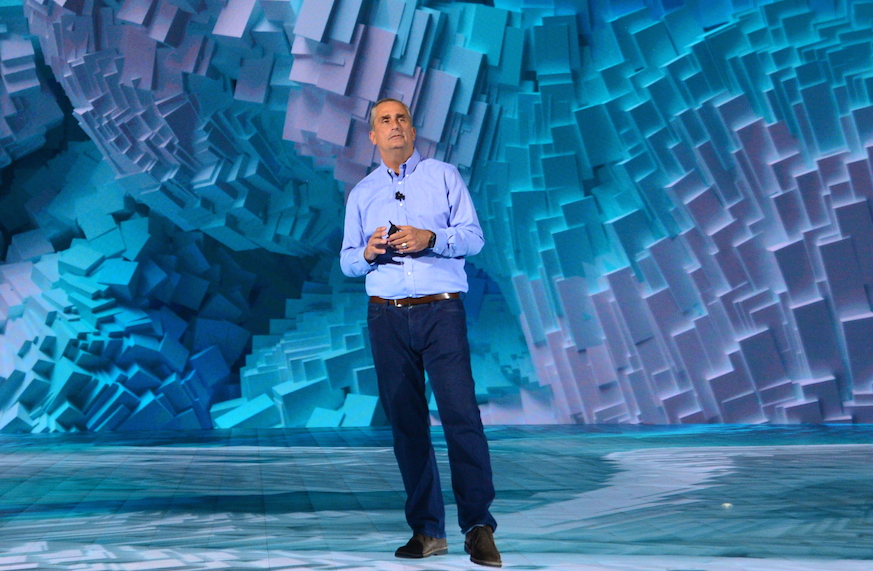 EMERGING TECH
EMERGING TECH
 EMERGING TECH
EMERGING TECH
 EMERGING TECH
EMERGING TECH
Almost as soon as he took to the stage at the Consumer Electronics Show in Las Vegas Monday evening, Intel Corp. Chief Executive Officer Brian Krzanich addressed one of the biggest challenges facing the company today: the Spectre and Meltdown security bugs that could compromise many processor chips sold over the last two decades.
“Our primary goal has been to keep our customers safe,” Krzanich (pictured) said during his keynote, insisting, “We have not received any information that these exploits have been used to obtain customer data.”
Krzanich said he wanted to “thank the industry” for working together to quickly address the bugs, adding that the response was a “collaboration” among many different companies. He also asked people to patch their systems as soon as patches become available. “We’ll continue working with the industry to minimize the impact on those workloads,” the CEO added in response to concerns that the patches hurt the performance of some machines and computing workloads.
With that issue out of the way, for now, Krzanich quickly issued a slew of announcements regarding the company’s progress in areas such as artificial intelligence, quantum computing, self-driving cars and virtual reality.
First up was Intel’s new artificial intelligence chip Loihi, which was announced in September. According to Krzanich, Intel now possesses a “fully functioning neuromorphic chip” that’s already capable of performing simple object recognition. The next step is to get the chip into the hands of the company’s partners so as to explore further use cases, Krzanich said.
The CEO then showed off a new 49-qubit quantum chip codenamed “Tangle Lake,” saying it was a major breakthrough for quantum computing and the next step toward “quantum supremacy.” He added that Intel is working with a Netherlands-based lab to develop and test the chip and other quantum computing systems but didn’t provide any timeline for when these might become available.
Krzanich also focused on Intel’s ongoing efforts in autonomous driving, announcing partnerships with carmakers, including BMW, Nissan, Volkswagen and Ferrari. Krzanich said 2 million cars built by BMW, Nissan and Volkswagen will begin using Mobileye Road Experience Management technology in order to crowdsource data in order to create low-cost, scalable high-definition maps for self-driving vehicles.
As for Ferrari, Intel is teaming up with the race car manufacturer to bring the power of artificial intelligence to the Ferrari Challenge North America Series. The idea is to use Intel’s AI technologies such as its Intel Xeon Scalable platform and neon Framework to enhance the motor sports experience for spectators and illustrate the potential of AI to transform the future of racing, Krzanich said.
Krzanich also outlined Intel’s role as official technology partner for the 2018 Pyeongchang Winter Olympics. The company plans to provide the largest-ever virtual reality experience, covering 30 events at the games both live and on-demand using Intel True VR technology. The technology utilizes multiple 360-degree cameras being places in and around playing fields and ski runs, Krzanich said. Intel’s software then stitches these recordings together to create an immersive VR experience that allows fans to view the action from different angles, choosing the camera position they want.
Staying with VR, Krzanich announced a new Intel Studios initiative that aims to bring the technology to other forms of media content such as movies. The idea, he said, is that viewers can “be the actor,” viewing scenes from numerous viewpoints thanks to the use of multiple cameras. According to Krzanich, this will lead to numerous possibilities, such as viewers being able to choose from which character’s perspective they wish to watch the movie.
Intel Studios will work with Paramount Pictures to work out how to initiate this “next generation” of visual storytelling, Krzanich said.
Intel earlier kicked off the show with a 17-minute performance by a “digital band,” with musicians effectively playing “data” while wearing and using StretchSense smart gloves and drum sticks equipped with sensors. The band also had some assistance from AI musicians playing sounds learned in real time.
Earlier at CES, Intel announced its 8th Gen Intel Core processor with Radeon RX Vega M Graphics chips, which is the latest version of its most powerful computer chip series, designed for high-end gaming and professional laptops.
THANK YOU